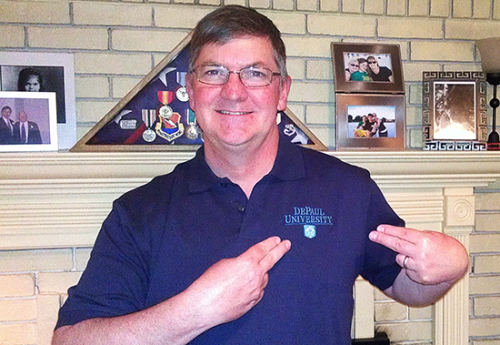Jun 19, 2013
Long path to a degree uncovers unexpected benefits
Long path to a degree uncovers unexpected benefits
John Misailedes started in DePaul University’s School for New Learning in 1989 as a 27-year-old National Guardsman who would have been happy to rush through his classes and collect his bachelor’s degree.
Then, life happened.
Misailedes deployed to war, serving in both Operation Desert Shield and Operation Desert Storm. Over the ensuing years, he experienced many major life events: marriages, divorces, the births of two daughters, his parents’ deaths, job changes and a life-threatening illness. Because the School for New Learning allows students to finish at their own pace, he fit in classes when he could and slowly earned the credits he needed to graduate.
Twenty-four years after taking his first class, the 51-year-old Naperville resident graduated with a Bachelor of Arts degree. But he says the length of time worked in his favor.
Misailedes, an information technology consultant, is most comfortable working in the world of numbers and technical systems. With the passing of time, he says he matured and gained a strong appreciation for a liberal arts education. The courses he took challenged his assumptions and beliefs, and, ultimately, changed his worldview.
“This exposure to the liberal arts was an incredible, unexpected benefit for me. Had I rushed through the program, I wouldn’t have been prepared to embrace that. I didn’t appreciate it in 1989. The most valuable part of the program was the part I valued the least,” he said. “I’m analytical, and I can talk dispassionately about anything. These classes really put me in an emotional place.”
The course Facing History and Ourselves opened his eyes to information he had never known about the Holocaust. He also will always remember Three Prophets of Nonviolence, a course that examined the lives and practices of famous nonviolent social activists.
“I had served in the Air Force working with missile tests and nuclear deterrence. In Three Prophets of Nonviolence, I read about the futility of it — that violence doesn’t solve anything — and I realized I couldn’t refute that idea and I couldn’t think of anything violence solved. But I could look at Gandhi’s work and see what nonviolence accomplished,” he said. “That class forced me to analyze a set of beliefs I’d never questioned.”
For a long time, Misailedes let two independent study classes stand in his way of completing his degree. Then, life intervened again — but not in a way one might expect.
Two years ago, a scuba-diving accident resulted in Misailedes suffering a stroke. A vascular surgeon later said the accident should have left him paralyzed or dead, but Misailedes survived the experience without muscle loss or nerve damage. He did, however, gain a new outlook on life. It finally was time to tackle the last two projects.
“I was at a point in life where I didn’t need the degree to be promoted or gain status,” he said. “The stroke really gave me the focus to realize this was important at my very core.”
Though his path to graduation may have been long, it showed his daughters that learning is a lifelong experience. It allowed him to watch the School for New Learning grow and adapt to the needs of adult learners. And it gave him the chance to fully appreciate the educational experiences that DePaul presented.
The result?
“I’m a different person.”
Written by Lynn Safranek

John Misailedes, who earned a bachelor’s degree from the School of New Learning at DePaul, stands proud in his DePaul golf shirt. The gift from his family is his first piece of DePaul sportswear. (Photo courtesy of John Misailedes)
